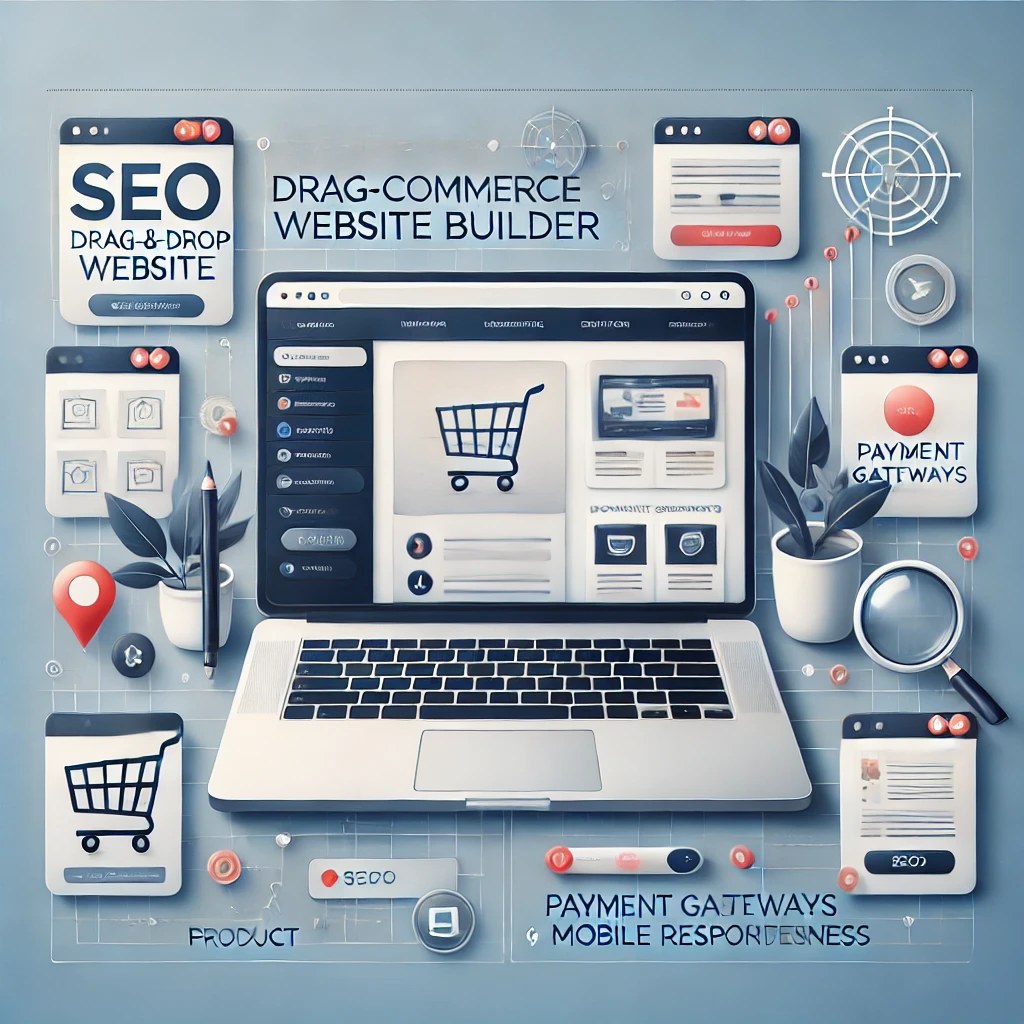The Ultimate Guide to Choosing the Best E-Commerce Website Builder in 2025

Introduction
In today’s digital landscape, having a robust online presence is essential for businesses of all sizes. Whether you’re a small business owner, an entrepreneur, or a large enterprise, choosing the best e-commerce website builder can make or break your success. But with so many options available, how do you find the right one?
This comprehensive guide will walk you through the key factors to consider when selecting an e-commerce website builder, the top choices available, and how to optimize your site for maximum performance.
1. What is an E-Commerce Website Builder?
An e-commerce website builder is a platform that allows businesses to create an online store without needing to code or hire a developer. These tools come with built-in templates, payment gateways, and marketing integrations to streamline the online selling process.
Key Features of an E-Commerce Website Builder:
- User-friendly Interface – Drag-and-drop builders make it easy for beginners.
- Customization Options – Allows branding with themes, fonts, and colors.
- Payment Integration – Secure checkout options for customers.
- SEO & Marketing Tools – Helps in driving traffic and sales.
- Mobile Responsiveness – Ensures a seamless experience on all devices.
2. Factors to Consider When Choosing an E-Commerce Website Builder
With various options available, choosing the right e-commerce website builder can be overwhelming. Here are essential factors to consider:
Ease of Use
A good e-commerce platform should be intuitive and beginner-friendly. Look for drag-and-drop editors and pre-designed templates to get started quickly.
Customization and Scalability
Your online store should grow with your business. Choose a platform that allows customization and offers scalability as your product catalog expands.
Payment Processing Options
Look for multiple payment gateways like PayPal, Stripe, and credit card integrations to provide customers with secure payment options.
SEO & Marketing Features
To increase visibility, ensure the builder offers SEO-friendly features like customizable meta tags, URL structure, and blogging capabilities.
Pricing & Transaction Fees
Compare pricing plans and check if the platform charges transaction fees on sales. Some platforms offer better pricing for high-volume sellers.
3. Top 5 Best E-Commerce Website Builders in 2024
1. Shopify – The Best Overall Choice
Shopify is the most popular e-commerce platform with powerful features, scalability, and a vast app marketplace.
- Pricing: Starts at $39/month
- Best For: Small to large businesses
- Pros: Easy to use, 100+ templates, excellent customer support
- Cons: Transaction fees unless using Shopify Payments
2. Wix E-Commerce – Best for Beginners
Wix provides a simple drag-and-drop interface with stunning templates, ideal for beginners.
- Pricing: Starts at $27/month
- Best For: Small businesses and startups
- Pros: Affordable, beautiful design templates, no coding required
- Cons: Limited scalability for large stores
3. BigCommerce – Best for Scaling Businesses
BigCommerce offers advanced e-commerce features suitable for growing businesses.
- Pricing: Starts at $39/month
- Best For: Medium to large-scale businesses
- Pros: No transaction fees, multi-channel selling, advanced SEO
- Cons: Steeper learning curve
4. WooCommerce – Best for WordPress Users
WooCommerce is a powerful, open-source plugin that integrates seamlessly with WordPress.
- Pricing: Free (with hosting and add-ons)
- Best For: Bloggers and businesses with WordPress websites
- Pros: Highly customizable, free to use
- Cons: Requires technical knowledge
5. Squarespace – Best for Design-Focused Stores
Squarespace is known for its stunning templates and design-oriented features.
- Pricing: Starts at $23/month
- Best For: Artists, designers, and creatives
- Pros: Beautiful designs, built-in marketing tools
- Cons: Limited payment options
4. SEO Best Practices for E-Commerce Websites
Even the best e-commerce website builder won’t guarantee traffic unless your store is optimized for search engines. Here are key SEO tips:
- Use Keywords Strategically – Optimize product descriptions, titles, and blog content.
- Optimize Site Speed – Compress images and use a fast hosting provider.
- Mobile Optimization – Ensure your website is responsive on all devices.
- Create Quality Content – Regularly publish blog posts related to your industry.
- Build Backlinks – Get links from reputable websites to increase domain authority.
5. Common Mistakes to Avoid When Building an E-Commerce Website
- Choosing the Wrong Platform – Not all platforms suit every business model.
- Neglecting SEO – Poor SEO can reduce visibility.
- Ignoring Mobile Optimization – A majority of shoppers browse on mobile.
- Complicated Checkout Process – A lengthy process increases cart abandonment.
- Lack of Clear Call-to-Actions – Every page should guide visitors toward a purchase.
Frequently Asked Questions (FAQ)
Q1: Which e-commerce website builder is best for beginners?
A: Wix and Shopify are the most beginner-friendly options with intuitive drag-and-drop features.
Q2: Can I switch my e-commerce platform later?
A: Yes, but it can be time-consuming and may involve migration costs.
Q3: What is the cheapest e-commerce website builder?
A: WooCommerce (with WordPress) is free but requires hosting, while Wix has affordable plans.
Q4: Do I need coding skills to use an e-commerce website builder?
A: No, most platforms are designed for non-tech users with drag-and-drop functionality.
Q5: How important is mobile optimization?
A: Extremely important! Google prioritizes mobile-friendly websites, and most users shop via mobile devices.
Recommended Posts

Shopify Migration Guide for Indian SMEs
June 26, 2025

Shopify Analytics & Funnels for Conversions
June 20, 2025


